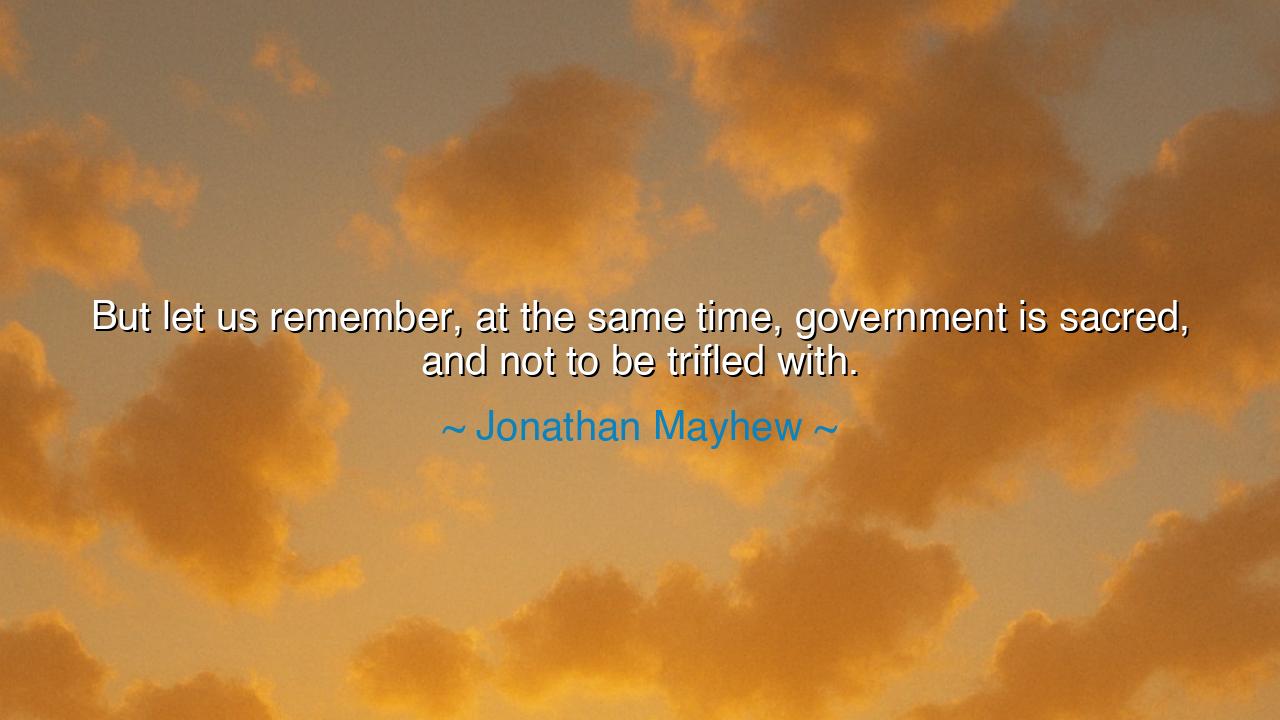
But let us remember, at the same time, government is sacred, and
But let us remember, at the same time, government is sacred, and not to be trifled with.






In the turbulent years before the birth of a nation, when the fires of conscience burned hotter than the fear of kings, the fiery preacher Jonathan Mayhew stood in the pulpit and spoke words that have echoed through the ages: “But let us remember, at the same time, government is sacred, and not to be trifled with.” These words were uttered not in submission, but in reverence — not as praise of tyranny, but as a warning to those who might mistake liberty for license. Mayhew, who preached in Boston in the mid-eighteenth century, lived at a time when the colonies wrestled with their duties to God and to government. He understood that freedom without order becomes anarchy, and authority without morality becomes oppression. His words were a call to balance — a sacred harmony between obedience and conscience, law and liberty.
The origin of this quote lies in Mayhew’s most famous sermon, delivered in 1750, on the anniversary of the execution of King Charles I of England. The sermon, titled “A Discourse Concerning Unlimited Submission and Non-Resistance to the Higher Powers,” was both a rebuke and a revelation. In it, Mayhew argued that rulers who govern unjustly forfeit their divine right to obedience — but he also cautioned the people not to treat government itself with disdain. He saw government as an institution ordained by God, not as an idol to be worshiped, but as a vessel through which justice and peace might flow. To trifle with it — to undermine it for selfish ends, to scorn its laws, or to rebel without cause — was to invite chaos. For though tyranny destroys freedom, so too does lawlessness, which leaves no ground for liberty to stand upon.
To understand Mayhew’s meaning, one must see the world he lived in. The people of the colonies were awakening to the idea that rulers are accountable to the governed, that kings and parliaments were not beyond question. Yet Mayhew feared that in their righteous anger against oppression, they might go too far — that in striking down tyranny, they might also strike down order itself. He reminded them that government, rightly understood, is not the enemy of freedom but its guardian. It is the framework that holds the human community together, preventing the strong from devouring the weak, and giving form to the moral law that binds society. To destroy that framework in haste is to tear down the very house in which justice dwells.
History has shown the wisdom of his warning. When the French Revolution erupted a generation later, the people rose in fury against monarchy, and for a brief, blazing moment, the cry of liberty filled the air. But in their zeal to overthrow tyranny, they destroyed not only the throne but the sacred order of governance itself. The result was not freedom, but terror — not justice, but blood. The guillotine replaced the scepter, and in the streets of Paris, government was trifled with until it became monstrous. What began as rebellion against oppression ended in submission to chaos. Mayhew, had he lived to see it, would have mourned, for he had long foreseen that liberty untempered by reverence becomes its own destroyer.
And yet, Mayhew’s words are not a call to blind obedience. When he declared that government is sacred, he did not mean that rulers are infallible or that power must never be questioned. He meant that the principle of government — the idea of just and lawful order — is sacred, for it is woven into the fabric of creation itself. It is the instrument by which human beings live together in peace, resolving disputes not through violence but through law. To trifle with government, then, is to trifle with civilization itself. But to accept unjust government without resistance is to trifle with righteousness. Thus, Mayhew carved a middle path between the two extremes — a path of wisdom, restraint, and courage.
His words carry weight even now, in an age where governments are often scorned and institutions mistrusted. Many forget that freedom requires discipline, and that the preservation of liberty depends upon respect for the rule of law. To mock, weaken, or ignore government in pursuit of personal gain is to erode the very foundation upon which freedom stands. But at the same time, citizens must never allow government to forget its sacred purpose — to serve, not to dominate; to protect, not to plunder. Mayhew’s wisdom demands of us not rebellion for rebellion’s sake, nor obedience without conscience, but the harder work of responsible citizenship, where reverence and accountability walk hand in hand.
The lesson, then, is this: treat government as one would treat a sacred fire — with respect, vigilance, and care. Feed it with truth, restrain it with justice, and never let it consume what it was meant to protect. The true patriot is not the one who despises government, nor the one who bows before it, but the one who honors it enough to keep it pure. Let every man and woman remember that the health of government depends upon the virtue of the governed. Where the people are corrupt, government cannot be holy; where the people are wise and steadfast, government can be a reflection of divine order.
So remember the words of Jonathan Mayhew: “Government is sacred, and not to be trifled with.” Let them stand as a beacon to every generation. Respect authority, but question power. Uphold law, but never surrender conscience. For in that delicate balance — between reverence and resistance, between obedience and justice — lies the heartbeat of a free and righteous people.






AAdministratorAdministrator
Welcome, honored guests. Please leave a comment, we will respond soon